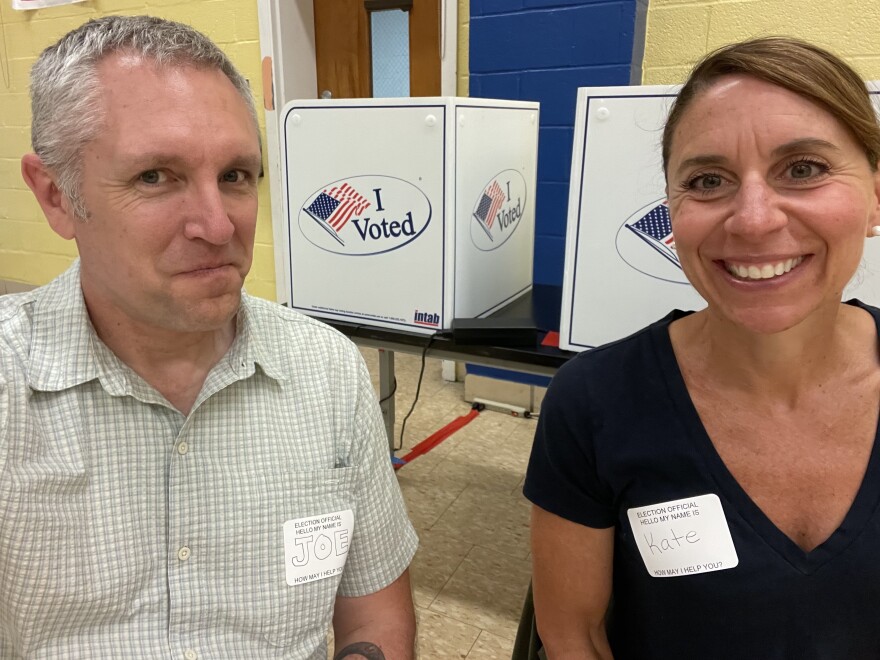Ellen Gustafson knows that the country is polarized and the rhetoric is red-hot. But in her politically diverse community of veterans and military spouses, it doesn't matter.
"Military spouses that I follow on Instagram ... there's a lot of stuff that people say that I just wouldn't agree with politically," she says. "But I will tell you, they are my biggest source of support. This is not my enemy, for God's sake. This is the person who I call when I needed someone to pick up my kid."
As threats against poll workers compound an already critical shortage of volunteers, Gustafson decided her community of fellow veterans was ideal to help. Last summer, she co-founded Vet the Vote, a campaign to recruit veterans and military families to serve again — at the polls. She thinks military veterans have great experience in one key area: following rules and procedures.
"The military and voting are two examples of when the bureaucracy is kind of awesome," she says. "You know, like when you have way too many people working in one big institution to do their very specific job, that's kind of great for voting and for keeping Navy ships afloat."
So far, the group has signed up more than 63,000 volunteers nationwide.
Veterans have signed up for lots of reasons. Andrew Turner, an Iraq vet in Michigan, says it was the plot to kidnap his governor, Gretchen Whitmer.
"It's scary," he says. "Seeing Gov. Whitmer be targeted for kidnapping, and then with January 6th and everything else, it's been very troubling to me because I'm seeing something that I didn't think would happen here in the U.S."
Turner saw political violence overseas and wants to do whatever he can to shore up democracy at home.
In Northern California, Donnie Hasseltine agrees. He served as a Marine for 22 years.
"From someone who actually was in Iraq during Iraqi elections, it's hard to think that you come back to the United States and you don't have a poll worker because someone's threatening one of those poll workers. And it made me think that, hey, I've got no problem dealing with that. And maybe there's another way I can continue my service and give back to my country," Hasseltine says, adding that if there was some sort of altercation at his polling station, a combat veteran like him might feel more confident to defuse it.
Some of the Vet the Vote volunteers have already served in primary elections, and many say the checks and balances gave them more confidence in the system.

"It felt like we were launching nuclear missiles or opening up a SCIF [sensitive compartmented information facility]," says Joe Plenzler, a retired Marine lieutenant colonel and a spokesman for Vet the Vote.
"The two-party integrity, the amount of the tamper-proof tape and the codes and the locks. I'm a natural born skeptic, and I walked out of there with an amazing level of confidence in, in my county's ability to run an election," he says.
And working alongside fellow veterans of different political persuasions was also encouraging, says Jerri Bell, who served in Naval intelligence for 20 years. She already worked one election, in 2020, near her home in Calvert County, Md.
"The election administrator pairs up a Republican with a Democrat. And my partner in the other political party and I kind of looked at each other sideways for about 30 seconds and then we started processing ballots and it just didn't matter," she said. "We just had a job to do and it really was the most nonpartisan thing I've done since I left the Navy. And that was a pleasure."
Some veterans joined the campaign because they themselves have questions about the process.
William Doyle served in the Navy from 2002 to 2017 and deployed on aircraft carriers USS Ronald Reagan and USS George H.W. Bush. But Doyle says he never voted for president until he got out of the military.
"I didn't want to have an opinion one way or the other about the commander in chief. You know, the bias if my party that I voted for wasn't elected," Doyle said.
Since the 2020 election, he's seen news reports and a documentary about voter fraud that left him unsettled.
"I'd like to believe that our democracy is protected and that the rights of the people are protected. And our vote, each and every vote is counted ... but sometimes you see the media's pointing in other directions," said Doyle.
Doyle lives in Virginia Beach, not far from Ellen Gustafson with Vet the Vote. She says she welcomes this kind of skeptic to the effort. She's confident that when he learns how polling stations are run, he'll reassure himself and others. Both Gustafson and Doyle will sit this election out, though — their polling stations had too many volunteers. It's a good problem, says Gustafson.
"There were 12 in my ZIP code alone that I saw in our database. So when you go to vote, you can trust that that population is there and that they know how to do the right thing," said Gustafson.
Copyright 2022 NPR. To see more, visit https://www.npr.org.





